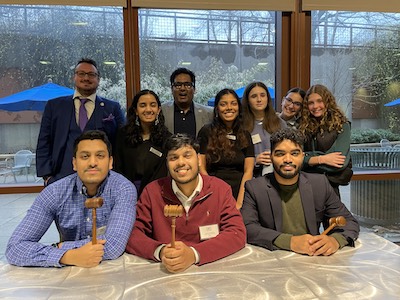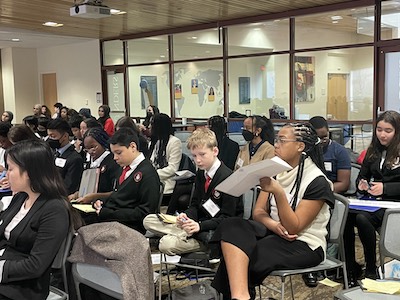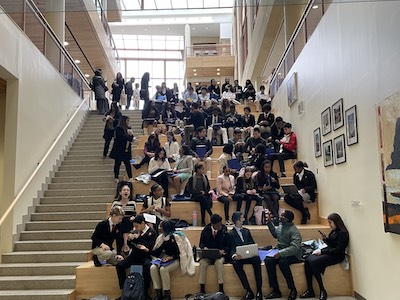By Himaja Balusa, Global Classrooms Program Assistant
The Global Classrooms DC (GCDC) of the United Nations Association-National Capital Area chapter hosted a winter training conference for students across the DC-Maryland-Virginia (DMV) region on January 29th at the American University's School of International Service.
After three years of virtual MUN conferences, the long-awaited in-person meeting was a resounding success, with a massive showing of over 100 students from seven schools in the DMV area. Organized into three different United Nations (UN) committees and assigned as representatives to various UN member states - students between the ages of ten to eighteen tackled complex global challenges within the structural framework of real-world diplomacy.
 The conference commenced with opening remarks from, Paula Boland, the President of UNA-NCA andSarmat Chowdhury, the Global Education Manager of UNA-NCA and Director of GCDC . They outlined the students' sponsors' and staff's excitement about having an in-person conference, the legwork put in by all parties involved to make this happen, and the value of having young people continue to engage with international issues through platforms such as this one in our uncertain times.
The conference commenced with opening remarks from, Paula Boland, the President of UNA-NCA andSarmat Chowdhury, the Global Education Manager of UNA-NCA and Director of GCDC . They outlined the students' sponsors' and staff's excitement about having an in-person conference, the legwork put in by all parties involved to make this happen, and the value of having young people continue to engage with international issues through platforms such as this one in our uncertain times. The opening keynote speaker was Sarah Bassil, Department of Defense Contractor and Master's Candidate studying International Security at George Mason University. Bassil, originally from Lebanon, spoke about her experience working with Lebanese refugees and the diaspora community. This work sparked her interest in MUN, leading her to form a club and continue her advocacy initiatives.
Following the conclusion of the opening ceremony, the students were disbursed into their respective United Nations (UN) committees, which were the Committee on the Peaceful Uses of Outer Space (COPUOS), The United Nations Framework Convention on Climate Change (UNFCCC), and The UN Security Council (UNSC). The committee sessions began with a UN-informed attendance policy, with delegates saying present or present and voting.
Each committee debated a set of problems within the scope of their work. COPUOS focused on two issues - the first being the need for an adequate legal framework around outer space that closely considers the technological and economic advancements made in this area over the past few years. While the second issue was about the potential perpetuation of an arms race with the growing use of outer space for military purposes.
 UNFCCC centered its debates around the issue of climate change and, specifically, the hazardous rates of greenhouse gas emissions present in the atmosphere. In addition, the UNSC focused on rising geopolitical instability, growing humanitarian problems, and state failure in Africa. The council also incorporated a crisis simulation modeled around real-world socioeconomic crises facing multiple African countries.
UNFCCC centered its debates around the issue of climate change and, specifically, the hazardous rates of greenhouse gas emissions present in the atmosphere. In addition, the UNSC focused on rising geopolitical instability, growing humanitarian problems, and state failure in Africa. The council also incorporated a crisis simulation modeled around real-world socioeconomic crises facing multiple African countries. Throughout these committee sessions, delegates put forward relevant motions on the above issues, debating them in moderated and unmoderated causes. A moderated caucus includes timed speeches by various delegates on the stated motions. The sequence of the speeches is based on a speaker's list created by the chair in the order in which delegates volunteered to speak.
Conversely, a set amount of time was allotted for unmoderated causes, which are informal, allowing delegates to move around freely to talk with other delegations and form coalitions with countries that share common ground on said issues.
Before the conference, the students were tasked with conducting background research and submitting position papers on their respective committees' stated problems to the organizers. Students were able to successfully condense this research into effective debate points within the time allotted for the caucuses. The committee sessions ended with delegates using the coalitions they formed during the conference to curate and present working papers, highlighting a unique policy to combat said challenges.
 The conference concluded with the Closing Ceremony, consisting of an awards ceremony and a closing ceremony speech by Shahamat Chowdhury from Capitol One and a Model UN veteran of 13 years. Chowdhury, a Talent & Performance Management Production Evolution Associate at Capital One, emphasized the relevance of MUN learnings in the real-world. He specifically enumerated the essentiality of skills such as problem-solving and public speaking within all professional sectors.
The conference concluded with the Closing Ceremony, consisting of an awards ceremony and a closing ceremony speech by Shahamat Chowdhury from Capitol One and a Model UN veteran of 13 years. Chowdhury, a Talent & Performance Management Production Evolution Associate at Capital One, emphasized the relevance of MUN learnings in the real-world. He specifically enumerated the essentiality of skills such as problem-solving and public speaking within all professional sectors. The awards were presented by chairs of the respective committees and included the following awards: Best Delegate, Outstanding Delegate(s), Honorable Delegate(s), and Best Position Paper.








